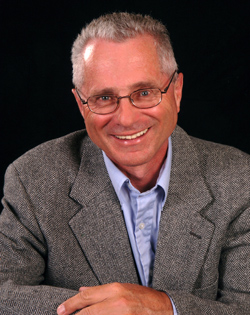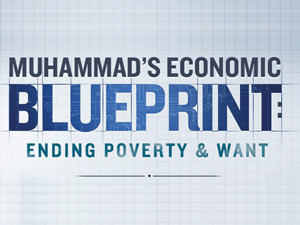Socialism and Muhammad’s Economic Blueprint
By FinalCall.com News | Last updated: Aug 9, 2013 - 11:21:04 AMWhat's your opinion on this article?
Earlier this year, in Phoenix, Arizona, the Honorable Minister Louis Farrakhan convened a meeting of 9 leading economic professionals of various schools of thought and ethnic backgrounds. Minister Farrakhan’s objective was to present the Economic Blueprint of the Honorable Elijah Muhammad to them and then receive their critical analysis of that Program. One of the attendees was Dr. Michael D. Yates, an expert on labor and economics and the Associate Editor of Monthly Review (http://monthlyreview.org) one of the most influential Socialist publications in the world. In addition to providing instruction at the University of Pittsburgh, Johnstown, MDY has taught working people for many years throughout America. Brother Cedric Muhammad recently interviewed MDY about the Socialist perspective as well as his opinion of the economic program of the Nation of Islam.
Cedric Muhammad (FCN): How would you define the essence of socialism or a socialist worldview? Is there a significant difference between it and communism?

Michael Yates
|
In socialism, we would ensure that life’s basic necessities—food, clothing, shelter, work, healthcare, security in old age—are guaranteed to all of us as matter of right. And we would establish institutions—schools, media, government—that would help to create human beings fully capable of maintaining democracy and equality.
As democracy and equality are deepened, we would be moving toward communism, a society in which human activities are voluntary and little, if any, coercion is necessary to get things done.
FCN: What has been the place of the Monthly Review in the American and international socialist community?
MDY: Monthly Review began publication in May 1949 as an “independent socialist magazine.” Its goal is to examine economics, politics, and culture from a radical perspective, pointing to the need for socialism. Monthly Review enjoys widespread respect and influence, much beyond our small size. This is because those who have written for the magazine are among the outstanding thinkers in the world, making the magazine a repository of the best writing on the harmful social consequences of capitalism and the need for socialism. Our international reach is reflected in six international “sister” editions of the magazine: Spanish, Greek, Turkish, and three Indian versions of Monthly Review.
FCN: What do you feel are the dominant economic issues and challenges of the day?
MDY: Here are four of them. First, we still confront an enormous racial divide. Black Americans, nearly 150 years after the end of the Civil War, still have much lower incomes, wealth, and wages than do Whites. They get paid less for the same work. They are less likely to own homes, and their rental housing is more often substandard. Their unemployment rates are typically double those of Whites. They suffer much higher imprisonment rates and have lower life expectancies and a higher incidence of infant mortality. This August is the fiftieth anniversary of the March on Washington for Jobs and Freedom. It is unconscionable that its goals have yet to be realized.
Second, the rapid growth of inequality in wealth and income has made the world a playground for the rich and a house of horrors for the poor. This makes a sham of democracy, greatly reduces economic mobility, gives rise to hopelessness among the have-nots, increases social tensions and insecurities, and leads to a host of physical and mental illnesses.
Third, there is a crisis of employment, especially for young persons. Unemployment rates are high, and those working toil for wages that have stagnated for forty years; today nearly 30 percent of all jobs wouldn’t support a family of four at the official poverty level of income. More than 200 million persons are unemployed worldwide, and another nearly 500 million employed persons cannot purchase basic necessities.
Fourth, we are in the midst of a catastrophic environmental crisis, caused in large part by the relentless quest for profits by global corporations. Global warming, soil erosion, air and water pollution, over-fishing, and species extinctions all threaten our food and water supplies, as well as our habitable land mass.
FCN: Have you identified any areas of compatibility, unity and coalition building between the American and International Socialist and Islamic communities?
MDY: There is fertile ground for unity in opposition to the unending “war on terror,” which has, in large part, been a war against Islamic communities and has included arrest, imprisonment, and torture of Muslims and the destruction of entire countries.
I have read that Islam is a religion of moderation in all things. Moderation is the antithesis of capitalism, which is a voracious beast, knowing no bounds. The bottom line is what matters, and acquisitiveness and greed are primary virtues. So, here again, socialist and Islamic communities have much in common.
Given Islam’s proscription against charging interest on borrowed money, perhaps Islamic and socialist communities could together find ways to stop the rapacious titans of global finance from diverting to themselves the world’s income. These predators destroy communities, rip to shreds the social safety net, and push hundreds of millions into poverty.

|
FCN: Earlier this year you met with the Honorable Minister Louis Farrakhan and were presented with an introduction to the Economic Blueprint of the Honorable Elijah Muhammad. What were your impressions of both the Minister and that Program?
MDY: I was impressed with Minister Farrakhan’s energy and considerable knowledge about the many economic issues we discussed. His concern and love for those in need was evident. Minister Farrakhan also proved a gracious and generous host in his home, where we enjoyed a fine meal and good conversation. He and his family went out of their way to make everyone feel welcome. It was certainly a day to remember and reflect upon.
In terms of the Economic Blueprint, I found it worth developing further. Much of it is applicable today. Its most fundamental principle is that we must control resources if we are to address our economic and social difficulties. And we must be part of a project larger than ourselves, one motivated by ideals of human solidarity and not just by self-interest.
Concretely, the Blueprint asks us to stop spending money foolishly and to save for both future growth and emergencies. This seems like excellent advice in a society built upon mindless consumption. Next, the Blueprint wants our savings to be pooled for community investment, in what we might call a development bank. Large sums of money could be raised from the small savings of millions of people. Then the bank could use the funds to benefit the community. Land could be purchased and agricultural enterprises begun. Distribution mechanisms could be established to get the food into the homes of those in need, and stores could be set up for food sales.
The Blueprint has been partially realized, first by the Honorable Elijah Muhammad and then by Minister Farrakhan, notably through the purchase of farmland and the growing of organic food. At our meeting, we discussed the possibility of building on this. Perhaps cooperative businesses could be started, such as urban farming and housing, both of which could include the training of those in need of meaningful work.
Minister Farrakhan made an important point. Although the blueprint focused on community self-help, the larger society, as embodied in the government, owed something to the people who built the nation. So, we must demand that our national government ensure the economic security of its people. As the Nation of Islam’s ten-point platform of 1963 demanded (and that of the original Black Panther Party reiterated), we must insist on full employment, decent housing, good education, an end to police brutality in our communities, an end to an unjust criminal justice system, and access to land, housing, clothing, and justice.
FCN: Thank you.
For an extended version of this interview please visit Dr. Yates' Blog (http://goo.gl/nTsFIl)
INSIDE STORIES AND REVIEWS
-
-
About Harriett ... and the Negro Hollywood Road Show
By Rabiah Muhammad, Guest Columnist » Full Story -
Skepticism greets Jay-Z, NFL talk of inspiring change
By Bryan 18X Crawford and Richard B. Muhammad The Final Call Newspaper @TheFinalCall » Full Story -
The painful problem of Black girls and suicide
By Charlene Muhammad -National Correspondent- » Full Story -
Exploitation of Innocence - Report: Perceptions, policies hurting Black girls
By Charlene Muhammad -National Correspondent- » Full Story -
Big Ballin: Big ideas fuel a father’s Big Baller Brand and brash business sense
By Bryan Crawford -Contributing Writer- » Full Story






 Click Here Stay Connected!
Click Here Stay Connected!








